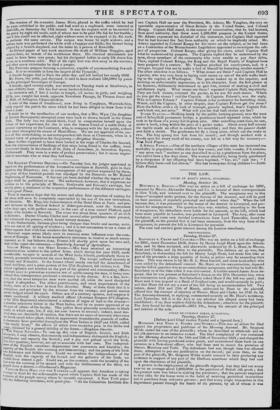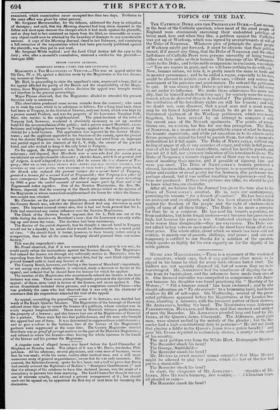THE LAW.
COURT OF KING'S BENCH, GUILDHALL.
Monday, October 26. MITCHELL V. BARING.—This was an action on a bill of exchange for 5004 accepted by Messrs. Alexander Baring and Co. in honour of their correspondents at New York, and indorsed over to the plaintiffs. The acceptance was in this form—" accepted under protest, for the honour of the drawers, and will be paid on their account, if regularly protested and refused when due." When the bill became due, it was presented at the house of the drawee in Liverpool, and pro- tested for non-payment. The question then was, whether, according to the form of acceptance, the defendants were liable for the amount, as the bill, which had been made payable in London, was protested in Liverpool. The Jury, after some hesitation, and some very decided instructions from Lord Tenterden, found for the plaintiff, on the ground that it had been necessary, from the very form of the acceptance, to present the bill in Liverpool for payment.
The case had excited great interest among the London merchants.
WESTMINSTER.
Tuesday, October 27. SAINSBURY V. CRAMP and Citownem—This was an action on a bill of exchange for 3001., dated December 1828, drawn by Henry Leigh Hunt upon the defend- ants, and by them accepted, and afterwards indorsed by H. L. Hunt, to Messrs. Hunt and Clarke, and by them to the plaintiffs. The defence set up was, that Sainsbury, in discounting the bill for Henry Leigh Hunt, had made him take as part of the proceeds a large quantity of books, at prices very far exceeding their value. This was sworn to by Mr. H. L. Hunt himself, and some booksellers who were called by the defendants' counsel. Mr. Hunt. on his reexamination, deposed that the bill in question was an accommodation acceptance, and that he had told Mr. Sainsbury so at the time when it was discounted. A builder named James Avan de- posed, that he was present at Sainsbury's house on the 27th December last, when the transaction took place ; that Sainsbury asked Hunt if the bill was good ; that Hunt said it was as good as a Bank of England note, and would certainly be paid ; and that Hunt did not say a word of the bill being an accommodation bill. Two letters, dated 122d and 25th of March, addressed by Hunt to the plaintiff, offered him the warrant of attorney of Messrs. Hunt and Clarke for 354/. 6.5.5d, The Attorney-General, in replying, commented severely on Mr. Hunt's testimony. Lord Tenterden left it to the Jury, to say whether the alleged usury had been established : if so, they ought to find for the defendants • otherwise for the plaintiff. The Jury found for the plaintiff-307/. 10s., being the amount of the principal and interest of the note.
COURT OF COMMON PLEAS, GUILDHALL.
Tuesday, October 27.
(Before Lord Chief Justice Tyndal and a Special Jury.)
MORRISON AND TODD V. FISHER AND OTHER:S.—This was an action for libel against the proprietors and publisher of the Morning Journal. Mr. Sergeant Wilde stated the case of the plaintiffs; whom he described as wholesale and re- tail silk-mercers to an immense extent. The libel complained of was contained in the Morning Journal of the 18th and 19th of November 1828; and charged the plaintiffs with having purchased stolen goods and surrendered them back on one
occasion to a Bow-street officer, who had been sent to search the preniises of Messrs. Morrison and Todd. The defendants had not, though time was allowed them, attempted to put any justification on the record; yet even then, on the part of the plaintiffs, Mr. Sergeant Wilde would consent to their producing any evidence in support of any part of the libellous assertions which they had cast upon the characters of the plaintiffs.
A person in the employment of the plaintiffs deposed, that they laid out every year on an average about 1,000,000/. in the purchase of British silk goods ; that the greatest care was taken in making the purchases; that the persons employed to buy silks for the house were in the habit of receiving periodical instructions not to purchase from unknown persons ; and that every single transaction in this department passed through the hands of six persons, by 0A of whom it was
examined, which examination never occupied less than two days. Evidence to the same effect was given by other persons.
Mr. Sergeant Merreweather, for the defence, addressed the Jury in mitigation of damages; and said, that the Morning Journal had long since recanted in the fullest and most open manner the charges which it had made against the plaintiffs, and as they had in fact sustained no injury from the libel, no reasonable or neces- sary object could now be attained by the awarding of damages to any considerable amount. A copy of the Morning Journal, dated in last February, and containing a full retraction of the imputations which had been previously published against the plaintiffs, was then put in and read.
Mr. Sergeant Wilde replied ; and the Lord Chief Justice left the case to the Jury ; who, after a moment's consultation, returned a verdict for the plaintiffs— damages 350/.
DEVON COUNTY SESSIONS.
IMPORTANT APPEAL UNDER THE NEW LICENSING ACT.
MERCHUTI v. THE MAGISTRATES Or NEWTON.—This was an appeal under the 001.Geo. IV. c. 61, against a decision made by the Magistrates at the last licens- itio- sessions at Newton.
r.Eird, in proceeding to state the appellant's case, expressed a hope, that as the appeal affected the purity of the tench and the' respectability of the Magis- trates, those Magistrates against whose decision the appeal was brought would notiaterfere in the present proceedings. Major pitman observed, that the Magistrates alluded to attended the present Sessions only as amateurs.
This observation produCed some severe remarks from the counsel ; who went on to state the 'caie, which is in substance as follows. For a long time back, there had been at Torquay, in the district of Newton, only one hotel, which was kept by a person named Poulton, and, was the property of Sir Lawrence Vaughan Palk,
Bart. Who resides in the neighbourhood. The great increase of the town of Torquay had; however, rendered it absolutely necessary to set up another hotel for the accommodation'Ofthe public; and a person named Merchetti, a con- fectioner and lodging-house keeper in Torquay, applied to the Magistrates of the district for a hotel licence. The application was rejected by the district Magis- trates; and the applicant appealed to the Sessions of the county, upon the ground that the district Magistrates, in 'refusing- the licence had acted from an improper and partial regard to the interests of Sir L. V. Palk, the owner of the present hotel, and who Wished to keep it the only hotel in Torquay. On the appeal, the Magistrates who had refused the licence were called as wilnesSei ; and deposed; that Merchetti was a man who had for many years maintained an unobjectionable charaeter ; that his house, which is at present full of lodgers, is well' adapted for a hotel; that he serves the best dinners at Tar- quay; that HE 15 THE ONLY PENSoN WHO SERVES AND IIAS SERVED 'DINNERS AND SUPPERS AT THE ONLY HOTEL NOW EXISTING IN THAT TOWN; that two years back, the Bench who refused the present licence fbr a second hotel at Torquay. granted a licence for a second hotel at Teignmouth ; that Torquay is a place of snore consequence than Teignmouth, and that it pays assessed taxes exceeding by 300/. a year the united amount of assessed taxes paid by East and h "est Teignmoutk taken together. One of the Newton Magistrates, the Rev. Mr. Kitson, deposed, that the courtesy of the Bench always relied on the opinion of the Magistrate in whose immediate neighbourhood the house for which the licence was sought was situated. Mr. Cr owder, on the part of the respondents, contended, that the question for the County Bench was, whether the District Bench had any discretion in suck cases. The learned counsel stated also, that it had not been proved that Sir L. Palk had exercised any undue influence over the Newton Magistrates.
The Clerk of the Newton Bench deposed, that Sir L. Palk was not at the tabletluring the deciSien on Merchetti's case ; that Sir Lawrence was only walk- ing up and down the room. The decision had been unanimous. The Rector of the parish deposed, that he thought a second hotel in Torquay would not he a benefit ; he meant that it would be objectionable in a moral point of view. " He should think it better, however, to have twenty tailors acting in competition, than that all the coats in Torquay should proceed from one manu- factory," This was the respondent's case.
Mr. Praed observed, that if it was necessary (which of course it was not), he could easily refute the insinuations against the Newton Bench. The Magistrates had refused the licence not through any unfriendly motive to Merchetti; who by appealing from their friendly decision against him, had by such black ingratitude proved 'himself unfit to have any licence at all.
The County Bench, however, not having a dne horror of Merchetti's ingratitude, or not seeing very clearly wherein it consisted, made a decision in favour of his appeal, and ordered that he should have the licence for which he applied.
The number of the Magistrates who upanimously refused the licence in the first instance was nine. There were sixteen 51agistrates present at the decision of the appeal of these, nine voted in favour of the licence; and seven aeainst it. The seven dissentients included three parsons' and a magistrate named Pitinan—who was probably the same who had observed that it was only in the character of amateurs that the respondents attended the trial of the appeal.
An appeal, resembling the preceding in some of its features, was decided last weelc at the Essex quarter Ssslons. The Magistrates of the borough of Harwich refused sforne time ago to renew the licence of a publican' whose conduct was in etety respect irreproachable. There were in Harwich thirteen public-houses, the property of a brewer ; and this brewer had one of the Magistrates of Harwich for a partner. There *ere tit two free public-houses, and the man who brought the appeal had one of them. It was determined to suppress these establishments ; and to give a colour to the buslneSs, two of the houses of the Magistrate's partners were suppressed at the same time. The County Magistrates decided that thee was no proof of C0171.1pi motives On the part of the Harwich Magistrates; and refused to renew the licence—thus leaving the whole business in le hands of the brewer and his partner the Magistrate. • A singular case of alleged lunacy was heard before the Lord Chancellor at Brighton on Monday week. The subject Of it was a Mr. pavis, tea-dealer, Phil- pot-lane. All hiS relations, several physicians, and some men of business swore that he was mad; while his nurse, sundry other Medical men, and a still more numerous array of general acquaintances, swore that he was only eccentric. His counsel, the SoliCitor-General, spoke for live hours and a half to prove that Davis had tnerely evinced the flightiness of Moliere's " Bourgeois Gentilhomme ;" and that the attempt of his relations to have him declared insane, was the result of a conspiracy to prevent him from marrying. The Lord Chancellor thought the case one of extreme cruelty, and advised a private arrangement of it ; but should such not be agreed on, he appointed the first day of next term for resuming the
discussion. - •



















 Previous page
Previous page